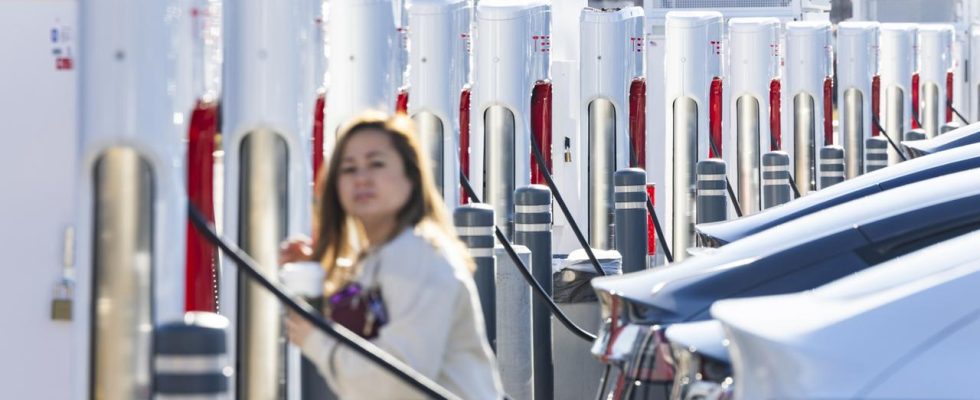The US car rental company Hertz wants to replace thousands of electric cars with combustion models. The company justifies this primarily with high costs. What are the consequences of the decision for electromobility?
It is a setback for e-mobility: The US car rental company Hertz announced last week that it would sell a total of 20,000 electric cars – around a third of the electric cars that are currently in the fleet. Hertz, one of the three largest car rental companies in the world, wants to use the proceeds to buy new combustion engine models. The US company said it is adapting to changing demand.
Experts like Helena Wisbert from the Center of Automotive Research (CAR) are extremely critical of this development: “The announcement is a further setback for the ramp-up of electromobility. Rental car companies are among the major buyers of electric cars and have contributed to high numbers of new registrations of electric cars in 2022 and 2023 ” she said opposite tagesschau.de.
Major orders from Tesla and Polestar
Hertz was also such a major buyer: In April 2022, for example, the company announced that it would buy up to 65,000 electric cars from the Polestar brand, which belongs to the car manufacturers Volvo and Geely. Hertz had previously placed a large order with Tesla in October 2021. 100,000 Tesla cars should be ordered by the end of 2022.
The then boss of Hertz, Mark Fields, wanted to respond to his customers’ wishes with the large order from Tesla, which was estimated to have a volume of around $4.4 billion: “Electric cars are now mainstream,” he said at the time. In its 2022 annual report, Hertz set the goal of having a quarter of its entire fleet consist of electric cars by the end of 2024. The company had already announced last year that it would expand the electric fleet more slowly.
Incomplete logistics
The US car rental company was particularly burdened by expenses for repairs after accidents. According to industry circles cited by Handelsblatt, the logistics for electric car components are often still patchy – even simple parts such as windshields or bumpers are sometimes difficult to obtain.
At Hertz, this led to enormous costs. The expenses for repairs were recently so high that the decision was made to reduce the electric car fleet. The company estimated the necessary writedowns at approximately $245 million.
Environmental bonus has expired
Even before Hertz’s announcement, the electric car market was under pressure – in Germany mainly due to the expiration of funding for electric cars. Since December 18, 2023, no new applications for the environmental bonus have been approved. Rental car companies such as Hertz or its competitor Sixt have no longer been able to apply for an environmental bonus since September 2023.
Fearing that sales figures could fall significantly after the funding stop, numerous manufacturers – including Audi, Volkswagen and Volvo – announced that they would pay the funding themselves, at least for a certain period of time. Because electric cars are still significantly more expensive to purchase than combustion engines: last year, the average price for an electric car, weighted according to new registrations, was 52,700 euros, according to the Center of Automotive Management (CAM). And as the current CAR Auto report on the new car market shows, there is a risk of a significant decline in sales of electric cars due to the elimination of the environmental bonus.
Used car prices as a problem
In addition to the high purchase prices, the used car market for electric cars is a major uncertainty factor. Because of the discounts on new car prices that Tesla has repeatedly advertised in recent months, the residual values of the models in the rental companies’ inventory are falling.
“This makes it more difficult to operate the vehicles in the rental car fleet economically, as rental cars are sold again after a certain period of time or are returned to the car manufacturer at negotiated prices,” explains Helena Wispert tagesschau.de.
Sixt wants more electric cars in its fleet
The German car rental company Sixt is also confronted with these problems and suffers from the high maintenance costs for electric cars, the difficult situation on the used car market and the poorly developed charging infrastructure in Germany. In an interview with “Spiegel,” Sixt boss Alexander Sixt recently said that customers’ “enthusiasm for electric cars still has room for improvement.”
Does Hertz’s decision now have a signaling effect for other car rental companies? Sixt announced at the request of tagesschau.de that they wanted to electrify “70 to 90 percent of our fleet in Europe” by 2030, despite the difficulties. According to the company, electrified vehicles already make up more than 20 percent of Sixt’s fleet in Europe.
With information from Lilli-Marie Hiltscher, ARD financial editorial team

